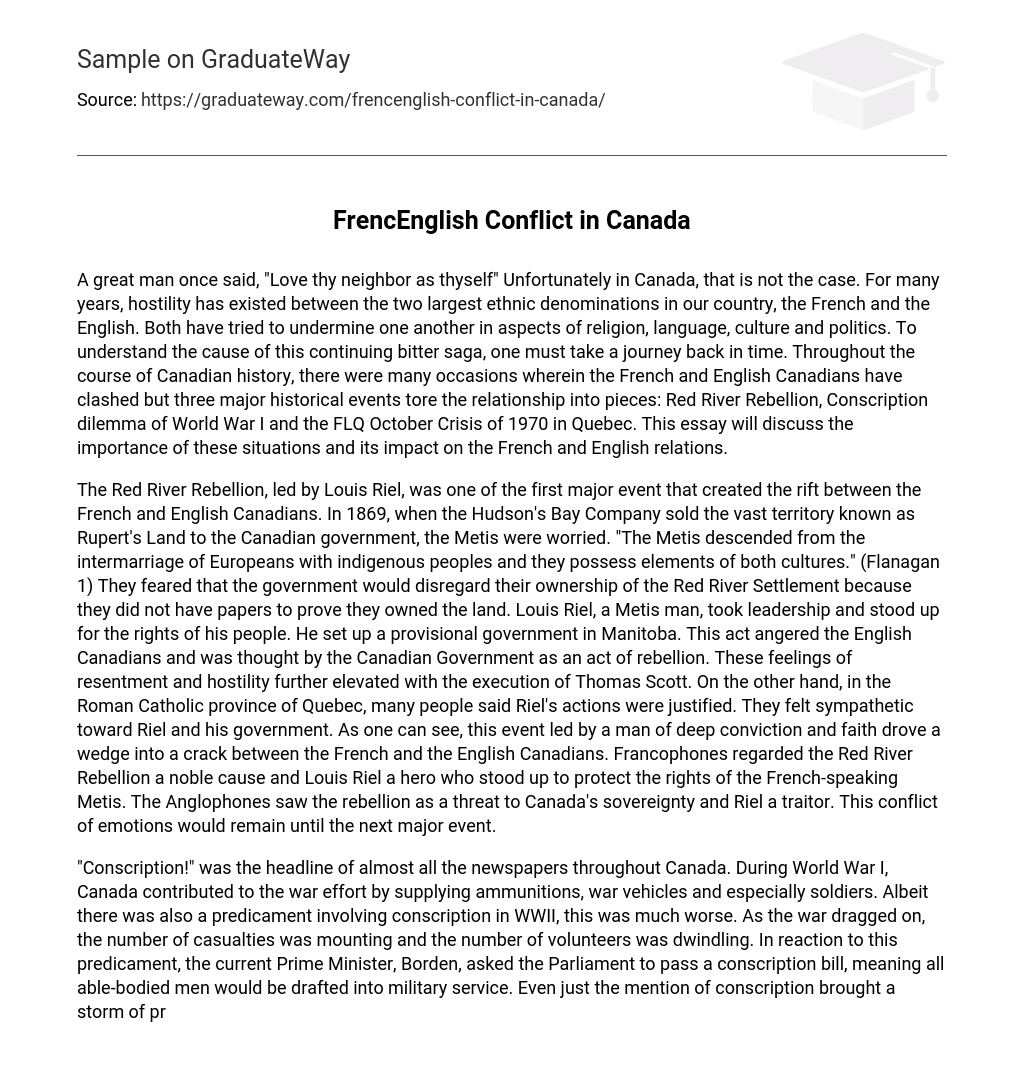Hostility between the French and English in Canada has a long history, with conflicts arising in religion, language, culture, and politics. To comprehend the underlying cause of this conflict, it is necessary to examine Canadian history. Various clashes have occurred between French and English Canadians over time; however, three significant events have had a particularly destructive effect on their relationship: the Red River Rebellion, the Conscription dilemma during World War I, and the FLQ October Crisis of 1970 in Quebec. This essay intends to explore the importance of these events and their impact on relations between French and English Canadians.
The Red River Rebellion, led by Louis Riel, was a significant event that caused division between French and English Canadians. In 1869, the Canadian government purchased Rupert’s Land from the Hudson’s Bay Company, leading to concern from the Metis. As descendants of intermarried Europeans and indigenous people, the Metis feared that their ownership of the Red River Settlement would be disregarded without proper documentation. Louis Riel, a Metis man, took a leadership role and established a provisional government in Manitoba, which was viewed as an act of rebellion by the Canadian Government and caused anger among English Canadians. However, in the predominantly Roman Catholic province of Quebec, many people believed that Riel’s actions were justified and sympathized with him and his government. This event, driven by Riel’s strong convictions and faith, intensified the divide between French-speaking and English-speaking Canadians. Francophones saw the Red River Rebellion as a noble cause and Riel as a hero defending the rights of the French-speaking Metis, while Anglophones viewed the rebellion as a threat to Canada’s sovereignty and Riel as a traitor.The turmoil of feelings would persist until the occurrence of the next significant event.
During World War I and World War II, Canadian newspapers were filled with headlines proclaiming “Conscription!” Throughout both wars, Canada played a vital role by supplying ammunition, war vehicles, and soldiers. However, in World War II, the situation worsened as casualties rose while volunteer numbers declined. To address this issue, Prime Minister Borden asked Parliament to pass a conscription bill that required all able-bodied men to serve in the military. This proposal sparked protests primarily from French Canadians who strongly opposed conscription. The passage of the Military Service Bill in 1917 further strained relations between Anglophones and Francophones. French Canadians resisted conscription due to feeling abandoned by France after their colony was conquered by British Forces in 1760 and perceiving dominance of English-speaking Protestant recruiters in military recruitment efforts.
In October 1970, Quebec experienced a crisis involving the FLQ (Front de libération du Québec) and the federal government which had significant consequences for subsequent years. The FLQ aimed to achieve Quebec independence through acts of terrorism such as kidnapping Prime Minister Pierre Laporte and diplomat James Cross. These kidnappings remain one of the most dramatic domestic events in Canadian history. In response to this threat, Prime Minister Trudeau implemented strict measures under the War Measures Act that suspended civil rights for all citizens.The FLQ crisis in October 1970 sparked anger among many Quebeckers due to the arrest and detention of numerous individuals based on their nationalist beliefs. These actions were seen by some as an overreaction or a conspiracy to seize control of Quebec. The kidnapping of Prime Minister Pierre Laporte and British diplomat James Cross by the FLQ was considered a significant event in Canadian history. In response, Prime Minister Trudeau enacted the War Measures Act, leading to restricted civil rights for all Canadians. This fueled suspicions that there was a plot to take control of their government, resulting in unjust detainment of individuals with nationalist beliefs. To this day, those who suffered wrongful persecution still hold resentment towards these actions. Undoubtedly, this act of terrorism played a crucial role in exacerbating French-English relations.
The French-English dissention in Canada’s past has been marked by conflict and struggles. Key events like the Red River Rebellion, the Conscription crisis of World War I, and the FLQ disaster in Quebec have further exacerbated the divide between French-English Canadians. Despite numerous attempts to improve the situation, the problem persists. However, we must not lose hope and remember Former Prime Minister Laurier’s words: “Two races share today the soil of Canada…There is no longer any family here but the human family. It matters not the language people speak, or the altars at which they kneel.”Bibliography:Hatt, Ken. et al. Louis Riel and the Metis. Manitoba: Pemmican Publications. 1979.
Flanagan, Thomas. “Red River Rebellion.” The Microsoft Encarta Encyclopedia, CD-ROM, 1998, ed.
Boulton, Major Charles, authored the book “I Fought Riel: A Military Memoir” which was published in 1985 by James Lorimer and Company in Toronto.
Fournier, Louis. FLQ: The Anatomy of an Underground Movement. Toronto: New Canada. 1984.
Watson, Bradley C.S. “Front de Liberation du Quebec.” The Microsoft Encarta Encyclopedia, CD-ROM, 1998, ed.
The Microsoft Encarta Encyclopedia, CD-ROM, 1998 edition, features an entry on Canada authored by Reed, Maureen, and Daniel J. Hiebert.





